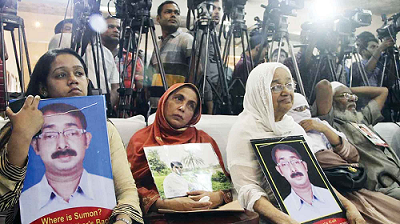In the last 15 years, 700 people have been victims of enforced disappearance in the country. According to a Facebook page of the Bangladesh Nationalist Party (BNP), 700 people have been subjected to enforced disappearances during the 15-year rule of the Awami League in Bangladesh.
However, data from the human rights organization Ain o Salish Kendra (ASK) states that 611 people have been victims of enforced disappearances during this period. According to the organization Odhikar, 677 people have been disappeared, while a report by the Asian Human Rights Commission in 2023 notes that 623 people have been victims of enforced disappearances in the last 13 years.
Meanwhile, the organization of victims of enforced disappearances, ‘Mayer Daak,’ recently provided a list of 158 individuals who had been disappeared at various times to the Director General of the Directorate General of Forces Intelligence (DGFI). It is known that a large number of people who were disappeared have not returned. Those who have returned after being held in unknown locations for a long time have remained silent about their experiences. However, since the fall of Sheikh Hasina on August 5, the situation has changed. Some of those who were disappeared have returned from the so-called ‘Ayna Ghor’ (Mirror Room) and have described the brutal torture they faced. Recently, an interim government in the country formed a five-member investigation commission to find those who have been disappeared. Additionally, yesterday, the country signed the international ‘Convention for the Protection of All Persons from Enforced Disappearance.’ On this note, like in other countries around the world, Bangladesh is also observing the International Day of the Victims of Enforced Disappearances today. The issue of enforced disappearances is not unique to Bangladesh; it is a problem in many countries around the world. According to Amnesty International, in the 1970s and 1980s, only illegal arms dealers and dissidents would disappear in Latin American countries. However, nowadays, ethnic minorities, drug dealers, and human traffickers are also victims of enforced disappearances. In developing countries like Bangladesh, it is alleged that enforced disappearances are regularly carried out under state patronage to suppress political dissent.
While the numbers of disappeared persons reported by various domestic and international human rights organizations, political parties, and families of victims working on enforced disappearances in the country differ slightly, it is found that nearly 700 people have disappeared in the last 15 years. Analysts consider this situation extremely concerning.
According to data from the human rights organization Ain o Salish Kendra (ASK), 611 people have been victims of enforced disappearances in the country over the last 15 years (2009-2023). Among them, the bodies of 78 individuals have been recovered. After abduction, 62 people were released, and 73 people have been shown as arrested. 383 people are still missing. The highest number of enforced disappearances occurred in 2016, with 97 people.
Statistics show that 3 people disappeared in 2009, 47 in 2010, 59 in 2011, 56 in 2012, 72 in 2013, 88 in 2014, 55 in 2015, 97 in 2016, 60 in 2017, 34 in 2018, 13 in 2019, 6 in 2020, 7 in 2021, 5 in 2022, and 9 in 2023. Abu Ahmed Faizul Kabir (Farid), a senior coordinator of the organization, said, “From 2009 to 2023, through media and our own investigations, we have found information on 611 people who have been disappeared. Some have returned after being disappeared, some have been shown as arrested, and many bodies have been recovered. Of these, 383 people are still missing, meaning they have not returned, or if they have, we do not have information on them.”
According to the human rights organization Odhikar, 677 people have been victims of enforced disappearances between 2009 and 2023 under the Awami League-led government. The highest number, 98 people, disappeared in 2018, the year of the 12th national parliamentary elections. Additionally, 3 people disappeared in 2009, 19 in 2010, 32 in 2011, 26 in 2012, 54 in 2013, 39 in 2014, 67 in 2015, 90 in 2016, 88 in 2017, 34 in 2019, 31 in 2020, 23 in 2021, 21 in 2022, and 52 in 2023.
According to a 2023 report by the Hong Kong-based international human rights organization Asian Human Rights Commission (AHRC), 623 people have been victims of enforced disappearances in the last 13 years. The organization states that among them, the bodies of 84 individuals have been recovered. 383 people have returned alive or were later shown as arrested, and no information is known about three people. 153 people are still missing.
Additionally, on August 18, the victims’ organization ‘Mayer Daak’ provided a list of 158 individuals who had been disappeared at various times to the Director General of the Directorate General of Forces Intelligence (DGFI).
The organization’s coordinator, Sanjida Islam, said, “All the cases of disappearances and murders that took place for political reasons from 2013 to August 5 of this year must be investigated. Legal action should be taken against officers of law enforcement agencies, including DGFI, RAB, Police, and DB, who are involved in these incidents.”
According to the Human Rights Commission, enforced disappearance is a crime and a violation of human rights. Although globally, enforced disappearance has become a practice, it started as a despicable tactic of authoritarian rule to avoid sending the bodies of enemies back home during times of war (as seen throughout Latin America in the 1970s) or to label people as terrorists who were considered enemies during civil wars (with the most well-known examples in Spain, Bosnia and Herzegovina, Rwanda, Syria, and Iraq). Later, these practices were refined and expanded through criminal networks. This is very concerning.
In such a context, on December 20, 2006, the UN General Assembly adopted an international convention for all persons who have disappeared. The ‘International Convention for the Protection of All Persons from Enforced Disappearance,’ which became effective in December 2010, declared August 30 as the International Day of the Victims of Enforced Disappearances. Since 2011, this day has been observed worldwide on August 30 to remember the disappeared and to show sympathy to their families. Alongside political activists, ordinary people have also been victims of enforced disappearances. This day is also observed in Bangladesh.
Bangladesh has approved the proposal to become a party to the ‘International Convention for the Protection of All Persons from Enforced Disappearance’ under the Interim Government’s Advisory Council. On Thursday, during a meeting at the State Guest House and the Prime Minister’s Office, Jamuna, the Chief Adviser Dr. Muhammad Yunus signed the convention. The Foreign Ministry initiated the signing of this agreement by Bangladesh.
According to related sources, one of the interim government’s priority issues is to ensure human rights for every citizen and carry out necessary institutional reforms accordingly. In this regard, the interim government has decided to prioritize Bangladesh’s accession to the ‘International Convention for the Protection of All Persons from Enforced Disappearance’ (ICPPED). This is the only international convention under the United Nations framework focused on enforced disappearances, aiming to prevent forced disappearances, ensure justice for victims, and enhance international cooperation in the fight against this serious human rights violation. So far, 75 countries have joined this convention.
Regarding this, Foreign Secretary Masud Bin Momen said, “The convention has a total of 45 articles, and any party state can notify the UN that it will not adhere to ‘one or more articles’ of the convention.” What is the Disappearance Convention?
Foreign Secretary Masud Bin Momen stated that there are nine UN conventions to establish human rights worldwide. Bangladesh has joined eight of these conventions, and on Thursday, it also joined the remaining convention on enforced disappearances.
The convention was introduced due to the excessive rise in the number of enforced disappearances during periods of political instability or other times worldwide. The aim of this convention is to collectively strive to prevent enforced disappearances, prevent impunity for this crime, and ensure justice and support for victims.
In South Asia, Sri Lanka and the Maldives have ratified this convention, meaning they have incorporated it into their domestic laws. India has only signed it and is yet to ratify it. Among the five permanent members of the United Nations, only France has ratified it.
In this convention, enforced disappearance is termed a crime against humanity. A committee of the United Nations, consisting of ten members, works to oversee whether this convention is being properly implemented.
This committee will review various reports from the states that are parties to the convention. Article 33 of the convention states that if systematic enforced disappearances occur in any member country, the committee members can visit the country to review the situation, although many member countries have not accepted this clause.
Victims will receive justice.
New laws will be enacted.
With Bangladesh becoming a party to this convention, on one hand, the victims or affected persons will receive justice, and their human rights will be protected. On the other hand, Bangladesh’s image will improve in the international arena.
“This is a groundbreaking step in the context of establishing human rights in Bangladesh. This convention will play a special role in protecting individuals from state-perpetrated torture. This document emerged to protect individuals from state persecution,” said former Foreign










